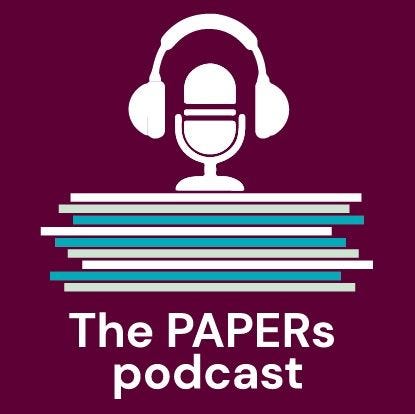Author: Marin Gillis, PhD, LPh
Recently, I had the honor of presenting a 90-minute session at the 7th International Conference on Faculty Development in the Health Professions held in conjunction with AMEE, the premier international association for health professions educators that was convened in Glasgow, Scotland.(1) I shared our work from the Office of Faculty Affairs and Learning Innovation (OFALI) at the Roseman University College of Medicine to create equitable, inclusive systems, procedures, and policies to support and promote all faculty. I also shared this very substack!
Of the many things I learned at the conference was an outstanding new resource for medical educators called The PAPERs (Professionals & Academics Parsing Educational Research) podcast.(2) This weekly podcast delivers concise discussions by leaders in medical education on recently published and significant journal articles—in under 30 minutes. They do the work of finding and analyzing important articles on medical education for you so that you may easily stay informed and enhance your educational practice. Subscription is free.
One of the hosts of the podcast was at the conference, Dr. Jonathan Sherbino, MD, MEd, FRCPC, FAcadMEd DRCPSC (Clin Ed), who leads the McMaster Education Research, Innovation, and Theory (MERIT) program. Jonathan is the past chair of the Royal College Emergency Medicine Specialty Committee, co-editor of CanMEDS 2015, and he is the cofounder of the Royal College Area of Focused Competence – Clinician Educator. He is also the co-host of the Key Literature in Medical Education (KeyLIME) podcast, a resource we have described in Preceptor, which has an audience in 40 countries around the world. Jonathan’s program of research is in diagnostic reasoning and competency-based medical education.
The PAPERs Podcast is produced by fellow Harvard-Macy scholar, Teresa Soro, and her team at the Unit for Teaching and Learning at Karolinska Institute in Sweden. Teresa and I were in the same learning group during the first iteration of the Harvard-Macy program now called, “Transforming your Teaching using Technology.” The Karolinska Institute is one of the foremost medical institutes in the world and by the terms of Alfred Nobel’s will, each year 50 voting faculty members of the institute select the winner of the Nobel Prize in Physiology or Medicine.(3)
This year, the Nobel Prize in Physiology or Medicine went to Katalin Kariko and Drew Weissman “for their discoveries concerning nucleoside base modifications that enabled the development of effective mRNA vaccines against COVID-19.”(4) For an interesting history of the Nobel prize in Physiology or Medicine see: https://www.nobelprizemedicine.org/selecting-laureates/history/
References
(1) https://amee.org/
(2) https://paperspodcast.ki.se/
(3) https://www.nobelprizemedicine.org/
(4) Press release. NobelPrize.org. Nobel Prize Outreach AB 2023. Oct 2023. https://www.nobelprize.org/prizes/medicine/2023/press-release/.



